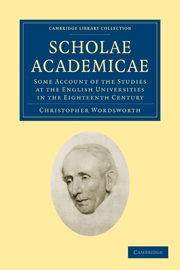 Scholae Academicae
Scholae Academicae Book contents
- Frontmatter
- PREFACE
- Contents
- CHAPTER I GENERAL INTRODUCTION
- CHAPTER II THE TRIPOS, name and thing
- CHAPTER III THE SOPHS' SCHOOLS before 1765
- CHAPTER IV ACTS AND OPPONENCIES after 1772
- CHAPTER V THE SENATE-HOUSE
- CHAPTER VI THE ADMISSION OF QUESTIONISTS. Huddling
- CHAPTER VII THE MATHEMATICKS
- CHAPTER VIII THE TRIVIAL ARTS
- CHAPTER IX HUMANITY
- CHAPTER X MORALS AND CASUISTRY
- CHAPTER XI LAW
- CHAPTER XII MODERN STUDIES
- CHAPTER XIII ORIENTAL STUDIES
- CHAPTER XIV PHYSICK
- CHAPTER XV ANATOMY
- CHAPTER XVI CHEMISTRY
- CHAPTER XVII GEOLOGY AND MINERALOGY
- CHAPTER XVIII BOTANY
- CHAPTER XIX The Degree of M.A.
- CHAPTER XX MUSICK
- CHAPTER XXI ASTRONOMY
- CHAPTER XXII CONCLUSION
- APPENDICES
- i RELLIQUIAE COMITIALES ex codd. Caiensibus ms.tis
- ii LETTERS from Persons in Statu Pupillari at CAMBRIDGE 170⅘—1791
- iii A STUDENT'S GUIDE 1706—1740
- iv Ἐγκυκλоπαιδεία, or A Method of Instructing Pupils, 1707
- v TRINITY COLLEGE EXAMINATIONS
- vi ST JOHN'S COLLEGE EXAMINATIONS (1765—1775)
- vii ANTIQUITIES OF THE TRIPOS LISTS AND CALENDARS
- viii ANTIQUITIES OF THE SCHOOLS from MSS. in Gonville and Caius Coll. (1772—1792)
- ix ANNALS OF THE CAMBRIDGE PRESS
- INDEX
vi - ST JOHN'S COLLEGE EXAMINATIONS (1765—1775)
Published online by Cambridge University Press: 07 September 2010
- Frontmatter
- PREFACE
- Contents
- CHAPTER I GENERAL INTRODUCTION
- CHAPTER II THE TRIPOS, name and thing
- CHAPTER III THE SOPHS' SCHOOLS before 1765
- CHAPTER IV ACTS AND OPPONENCIES after 1772
- CHAPTER V THE SENATE-HOUSE
- CHAPTER VI THE ADMISSION OF QUESTIONISTS. Huddling
- CHAPTER VII THE MATHEMATICKS
- CHAPTER VIII THE TRIVIAL ARTS
- CHAPTER IX HUMANITY
- CHAPTER X MORALS AND CASUISTRY
- CHAPTER XI LAW
- CHAPTER XII MODERN STUDIES
- CHAPTER XIII ORIENTAL STUDIES
- CHAPTER XIV PHYSICK
- CHAPTER XV ANATOMY
- CHAPTER XVI CHEMISTRY
- CHAPTER XVII GEOLOGY AND MINERALOGY
- CHAPTER XVIII BOTANY
- CHAPTER XIX The Degree of M.A.
- CHAPTER XX MUSICK
- CHAPTER XXI ASTRONOMY
- CHAPTER XXII CONCLUSION
- APPENDICES
- i RELLIQUIAE COMITIALES ex codd. Caiensibus ms.tis
- ii LETTERS from Persons in Statu Pupillari at CAMBRIDGE 170⅘—1791
- iii A STUDENT'S GUIDE 1706—1740
- iv Ἐγκυκλоπαιδεία, or A Method of Instructing Pupils, 1707
- v TRINITY COLLEGE EXAMINATIONS
- vi ST JOHN'S COLLEGE EXAMINATIONS (1765—1775)
- vii ANTIQUITIES OF THE TRIPOS LISTS AND CALENDARS
- viii ANTIQUITIES OF THE SCHOOLS from MSS. in Gonville and Caius Coll. (1772—1792)
- ix ANNALS OF THE CAMBRIDGE PRESS
- INDEX
Summary
Dr William Samuel Powell, B.A. 1738, was elected master of S. John's College Cambridge in 1765. ‘In the very first year of his mastership he applied himself to the establishment of those college examinations which before his time were unknown in our university, and which form so excellent a test of proficiency in the various subjects of lectures. The examination lists still preserved in S. John's, which were all drawn up with great care and consideration by Dr Powell himself, as long as he presided over the college [till 1775], bear strong testimony to the acute discrimination, the strict impartiality and the resolute industry with which he conducted and perfected this his favourite scheme.’ By prizes and punishments he overcame the opposition which the young men at first presented.
‘He allowed the students of no year to pass without examination in one of the Gospels, or the Acts of the Apostles; no talents or acquirements being permitted to compensate for the neglect of this.’
The entry in the S. John's coll. conclusion-book is as follows.
5th July, 1765. ‘Agreed that the examiners annually chosen shall by themselves or their sufficient deputies examine the undergraduates, both fellow-commoners and others publickly in the hall twice a year, the time and subjects to be determined by the master.’
- Type
- Chapter
- Information
- Scholae AcademicaeSome Account of the Studies at the English Universities in the Eighteenth Century, pp. 352 - 357Publisher: Cambridge University PressPrint publication year: 2009First published in: 1877
